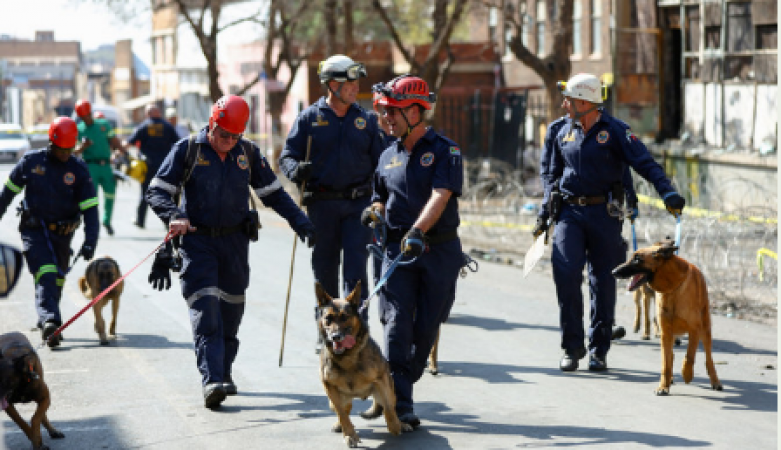
Johannesburg: In the wake of a devastating apartment fire that engulfed a run-down five-storey building in Johannesburg, South Africa, leaving more than 70 lives lost, including numerous children, intensive efforts are underway to unravel the cause of the tragedy. Sniffer dogs have been deployed to comb through the ashes and debris, with the aim of unearthing crucial clues that may shed light on the origin of the blaze.
The fire, which erupted in the early hours of Thursday morning, has thrust the nation into mourning and left a trail of devastation. It has not only claimed lives but also rendered countless individuals homeless, exacerbating an already dire humanitarian crisis in Johannesburg.
The cause of the fire remains shrouded in uncertainty, though initial assessments by investigators suggest it may have been triggered by an electrical fault. This tragic incident underscores the importance of stringent electrical safety measures in residential structures.
Also Read: Bhubaneswar, Guwahati Host India's First 2 FIFA World Cup Qualifiers
Specialized sniffer dogs, trained to detect human remains and accelerants, such as petrol, have been deployed to meticulously search the rubble of the building. Their mission is to uncover any traces that could provide critical insights into the circumstances surrounding the fire's outbreak.
This search operation is a collaborative effort involving firefighters, police officers, and forensic experts. It is a painstaking and meticulous process, complicated by the fact that the rubble remains hot and unstable.
The aftermath of the fire has precipitated a major humanitarian crisis in Johannesburg. Numerous individuals have been left not only homeless but also grappling with the dire challenges of securing food and water. In response, the government has established relief camps to provide assistance to those adversely affected by the tragedy.
The fire serves as a stark reminder of the heightened dangers posed by fires in informal settlements. These settlements, characterized by overcrowding and substandard construction, are particularly susceptible to fire outbreaks. As such, they represent a pressing concern in terms of fire safety and disaster preparedness.
Also Read: Philippines and Iraq Explore Partnership to Enhance Nursing Education and Collaboration
While the government has pledged to enhance fire safety measures in informal settlements, the issue is multifaceted and requires sustained efforts to rectify. Informal settlements present a myriad of challenges, from poor infrastructure to inadequate access for emergency responders.
Improving fire safety in these communities necessitates a comprehensive approach that includes:
Infrastructure Upgrades: Ensuring that housing in informal settlements meets minimum safety standards, including electrical safety measures.
Fire Safety Education: Raising awareness among residents about fire prevention and evacuation procedures.
Emergency Response: Enhancing the capabilities of local emergency response teams to swiftly and effectively address fire incidents.
Access to Services: Improving access to basic services, such as water and electricity, to reduce the reliance on hazardous makeshift solutions.
Community Engagement: Fostering community involvement and collaboration in fire safety initiatives.
Also Read: Bangladesh Confronts its Worst-Ever Dengue Fever Outbreak: A Looming Public Health Crisis
The tragic fire in Johannesburg serves as a somber reminder of the urgent need to prioritize fire safety, particularly in vulnerable communities. While the immediate focus is on investigating the cause of this devastating incident, it is equally vital to proactively work towards preventing such tragedies in the future.
The heartbreaking loss of life and devastation wrought by the Johannesburg apartment fire demand a collective response. It is a call to action for governments, communities, and stakeholders to unite in their commitment to fire safety, disaster preparedness, and the well-being of all citizens. While this incident is marked by tragedy, it carries within it an opportunity to drive lasting change and ensure that the lives lost are not in vain.